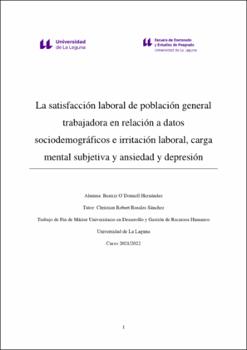La satisfacción laboral de población general trabajadora en relación a datos sociodemográficos e irritación laboral, carga mental subjetiva y ansiedad y depresión.
Author
O'Donnell Hernández, BeatrizDate
2022Abstract
Una de las principales diferencias sobre cómo se concebía el trabajo antes y en la
actualidad, es el hecho de dar valor a la satisfacción de las personas en su puesto de trabajo y
conocer qué influye en experimentar esta variable o no, por tanto, el objetivo del presente
estudio es comprobar qué relación existe entre irritación laboral, ansiedad y depresión y carga
mental con la satisfacción laboral, así como, comprobar si determinadas características
sociodemográficas influyen en estas. La muestra de este trabajo esta compuesta por 53
trabajadores. Los participantes cumplimentaron un cuestionario on-line formado por cuatro
escalas con un total de 59 ítems. Los resultados obtenidos señalan que existe relación entre la
irritación laboral y la satisfacción laboral y entre la carga mental subjetiva y ansiedad,
depresión e irritación laboral. Además, el tipo de turno influye en experimentar mayor irritación
y carga mental, el nivel de ingresos en la carga mental y el nivel de estudios en el nivel de
Irritación Laboral. En conclusión, tanto el tipo de turno, como el nivel de ingresos y educativo,
correlacionaban con alguna de las 4 variables principales.
Palabras clave: Irritación laboral, Satisfacción laboral, Ansiedad y Depresión y Carga Mental
Subjetiva. One of the main differences about how work was conceived before and now is the fact
of giving value to people's satisfaction in their job and knowing what influences them to
experience this variable or not. Therefore, the aim of this study is to check the relationship
between job irritation, anxiety and depression and mental workload with job satisfaction, as
well as to check whether certain socio-demographic characteristics influence these. The sample
of this study is composed of 53 workers. The participants completed an on-line questionnaire
consisting of 4 scales with a total of 59 items. The results show there is a relationship between job irritation and job satisfaction and between subjective mental workload and anxiety,
depression and job irritation. In addition, the type of shift influences the experience of greater
irritation and mental workload, the level of income on mental workload and the level of
education on the level of Job Irritation. In conclusion, both shift type, income and educational
level correlated with some of the 4 main variables.
Keywords: Job Irritation, Job Satisfaction, Anxiety and Depression and Subjective Mental
Workload Máster Universitario en Desarrollo y Gestión de Recursos Humanos Por la Ull





